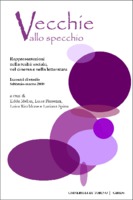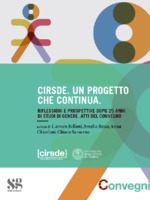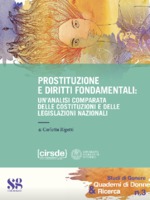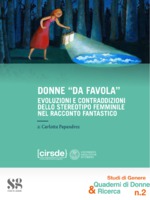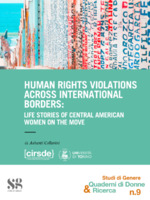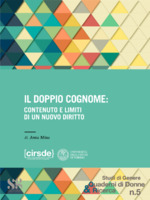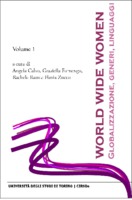Sfoglia documenti (27 in totale)
- Collezione: CIRSDe
Sort by:
Vecchie allo Specchio. Rappresentazioni nella realtà sociale, nel cinema e nella letteratura
Dal 7 febbraio al 13 marzo del 2008 il CIRSDe, con il patrocinio della Città di Torino, dell'Università e dell'Unione Culturale, organizzò presso la sede di quest'ultima un ciclo di proiezioni cinematografiche sul tema dell'invecchiamento, affiancato da due incontri di studio e da una mostra fotografica. L'intento della manifestazione, intitolata Vecchie allo specchio. Rappresentazioni nella realtà sociale, nel cinema e nella letteratura, era di combinare approcci e competenze molto diverse, non solo quelle delle discipline letterarie e storico-sociali, ma anche quelle delle arti visive, per far emergere la complessità delle rappresentazioni della vecchiaia delle donne. Questo volume raccoglie i testi dei due incontri, la presentazione della rassegna cinematografica corredata dalle schede dei dieci film in programma; la presentazione della mostra fotografica e la riproduzione di alcuni lavori.
CIRSDe. Un progetto che continua. Riflessioni e prospettive dopo 25 anni di studi di genere. Atti del Convegno
Giovedì 1 e venerdì 2 dicembre 2016, presso l'Aula Magna del Campus Luigi Einaudi e l'Aula 1 della Palazzina Einaudi, si è svolto il convegno dal titolo "CIRSDe. Un progetto che continua. Riflessioni e prospettive dopo 25 anni di studi di genere", il cui intento era quello di proporre un momento di riflessione sullo stato dell’arte dei Gender and Women’s Studies in chiave multidisciplinare e dialogica a 25 anni dalla nascita. Questo volume raccoglie i testi degli interventi suddivisi nelle quattro sessioni tematiche denominate TERRE, CORPI, LAVORO E POTERE.
Nella sessione TERRE si sono intrecciati i cambiamenti climatici e il coltivare la terra con il complesso contesto delle migrazioni in terre diverse dai propri luoghi di nascita. La sessione CORPI ha dato voce alla rappresentazione corporea così come a quella antropologica e medica, fino al delicato dibattito della maternità surrogata/gestazione per altri. Il lavoro di donne e uomini, la conciliazione dei tempi, la sotto rappresentatività delle donne in ambiti lavorativi maschili e la triste attualità del lavoro precario è stato invece il tema portante della sessione LAVORO. La sessione POTERE ha trattato aspetti giuridici e politici, così come lo sconcertante problema della violenza di genere.
L’intervento appassionato di Laura Boldrini, Presidente della Camera dei Deputati, attraversa le numerose criticità che le donne devono affrontare nel loro quotidiano: la violenza di genere (anche nel web), la conciliazione dei tempi, la difficoltà di avere riconosciuto il proprio ruolo nei diversi contesti di lavoro e di vita quotidiana, il mettere a fuoco che la maternità è strettamente correlata alla genitorialità.
Prostituzione e diritti fondamentali: un'analisi comparata delle costituzioni e delle legislazioni nazionali
Lo scritto analizza i modelli legislativi esistenti in materia di prostituzione sul panorama europeo, soffermandosi su quei delicati profili giuridici inerenti il bilanciamento dei diritti fondamentali racchiusi nelle singole Costituzioni nazionali. In particolare l'analisi riguarda l'ordinamento russo, svedese, italiano e tedesco, che rispettivamente riflettono il proibizionismo, il neoproibizionismo, l'abolizionismo e la regolamentazione della prostituzione.
The work deals with the existing relationship between prostitute's fundamental rights and all the legal frameworks which are in force in Europe.
Chapter I examines some legal, thorny issues concerning prostitution, such as the disposal of the body, the notion of human dignity, the equality principle, the general clause of good customs, the right to work and to health and. In Chapters II-V these issues are transposed into the analysis of four European States' Constitution and legislations.
The Russian prohibitionism is characterised by the prostitutes' administrative prosecution on the basis of public morality and health.
The Swedish neo-prohibitionism aims at establishing a gender policy, which is grounded on a new social order; as a result, Swedish law subjects clients to sanctions, while considering prostitutes as victims who deserve a special protection.
Italian abolitionism provides for a freedom to prostitute yourself which must be in compliance with the general clause of public morality, while prosecuting all those activities that are ancillary and apt to violate the prostitutes' self-determination; in any case, the legislative aim is to respect and fulfil all the constitutional fundamental rights.
The German regulatory framework regards prostitution as an expression of the occupational freedom provided by the Basic Law, in order to promote the individual's substantial self-determination and to protect prostitutes' fundamental rights.
Finally the work ends with a short consideration on whether there is - or there is not - a legal pattern which is apt to protect all the fundamental rights to whom prostitutes are entitled.
Donne "da favola". Evoluzioni e contraddizioni dello stereotipo femminile nel racconto fantastico
How has the image of the woman changed over time? Can we say that certain "old" stereotypes have lapsed?
In this analysis I’ve reflected about the theme, comparing some modern cinematographic revisitations and the corresponding written texts in the field of the fantastic genre, to understand if and how the female image (and not only) has changed from a century to another (in this case between the 19th and the 21st century).
The research has developed through the semiotic and gender studies, in order to analyze the diversities and the characteristics of the various texts observed (written and audiovisual) and to realize how the idea of feminine is changed and, maybe, evolved, proposing new type of characters (and also a new and complex dialogue with the masculine counterpart).
It emerges, indeed, the necessity to reflect on these stereotypes, on the modalities of development over time and on the difficulty that still today, despite certain changes, remains in thinking them (and thinking differently).
Because, in the end, what does it mean male and female? What makes us who we are?
Human rights violations across international borders: life stories of Central American women on the move
The essay documents and analyses the topic of violence in Central American migration, with a specific focus on migrant women in the current mobility regime South-North. We start by tracing the conditions that push women to undertake the migratory path in their countries of origin, more specifically in the Northern Triangle countries, that include Honduras, El Salvador and Guatemala; we then analyze the moment of transit, in order to highlight some of the great challenges that women incur in their path towards the destination country, being it Mexico or the United States; lastly, we shed light on the border-crossing experience and on some life stories in the context of arrival. Through this work we aim at demonstrating that the journey of Central American women is shaped by different forms of violence in every step of migration, and how the mobility and border regime is strongly compromised by the lack of application of a human rights approach. The personal contribution to this work is given by a fieldwork realized through eight qualitative interviews with experts in the field.
Il doppio cognome: contenuto e limiti di un nuovo diritto
The work aims to analyze the current legislation on the transmission of the surname to the children in the Italian legal system, to verify if this rule respects the principle of equality between the parents and the principle of the protection of the child's personal identity.
The rule of automatic transmission of the father's surname was indeed a glaring symbol of discrimination between parents, which reflected a deep-rooted background of inequality between men and women that can still be seen today.
The decision of the Corte Costituzionale n. 286/2016 stated that parents can give their child the surname of the father, followed by the surname of the mother if both are in agreement. Nevertheless, there are issues that a jurisprudential decision, even if crucial for the matter, cannot resolve. In fact, the judgment doesn't solve the question of the accumulation of surnames in future generations, and doesn't decide whether the children of the same family should have the same surname.
After a careful analysis of the issues that currently remained unresolved, hypotheses will be formulated to find solutions that are both respectful of the right of equality between parents and of the personal right of the child to have both branches of his family recognized in his surname. Lastly, the answers obtained from the interviews regarding the matter of the "double surname", in which several Italian municipalities participated, will be examined and will be subject to reflection.
World Wide Women: Globalizzazione, Generi, Linguaggi — Vol. 1
Questo è il primo di una serie di 4 volumi che raccolgono una selezione degli atti del convegno internazionale «World Wide Women: Globalizzazione, Generi, Linguaggi», organizzato dal CIRSDe nel febbraio 2011 c/o l’Università di Torino. I/le ricercatori/trici si sono confrontati in una prospettiva gender oriented sulla globalizzazione, l’incontro di culture, il transculturalismo, il superamento dei confini nazionali, la migrazione, i linguaggi, lo sviluppo economico.
Questo primo volume affronta più nel dettaglio le seguenti tematiche: gli effetti della crisi mondiale attuale sulle donne; il ruolo delle donne scienziate e il loro rapporto con lo sviluppo e la scienza; la migrazione dei gender studies nello spazio francofono.

